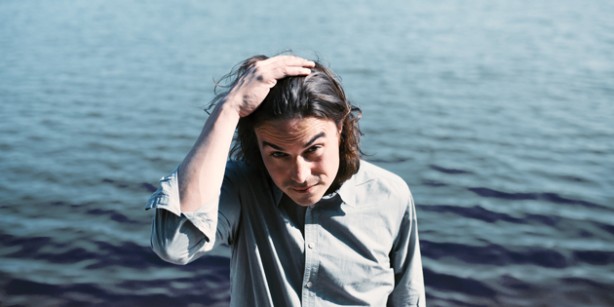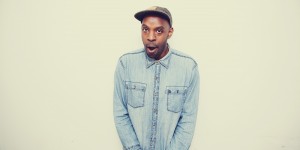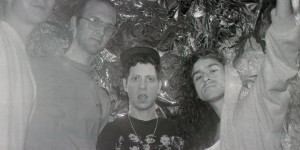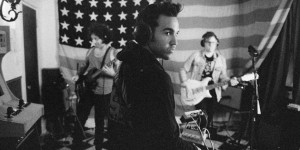 Music
Music
Q&A: Moonface's Spencer Krug rediscovers the piano and the effects of love
by Jabbari Weekes
November 5, 2013
Considered by fervent fans and media as one of the best songwriters of this generation, Spencer Krug has been a defining part of Canadian indie music. With over twenty records to his name, Krug’s expansive resume ranges from keyboardist to lead vocals for defunct favourites like Frog Eyes, Wolf Parade, and Sunset Rubdown; his latest project, Moonface, was a way to expand on his own ideas without the constraints of being in a group. As his former bands deteriorated, Krug would focus solely on the newly developed persona, and, shortly after, moving to Helsinki, whose cold winters would help shape 2012’s With Siinai: Heartbreaking Bravery, and his most recent work, Julia with Blue Jeans.
The new album is comprised of his most lyrically and sonically stripped down work to date, consisting only of Krug’s distinct vocals and the tell-tale cries of the piano. Over the opening track on Julia, Krug yells, “I am a barbarian sometimes, been a barbarian most of my life.” Despite the almost hedonistic boasts, the lyrics reveal Krug’s introspective conflict of confidence. We spoke with Krug to discuss the value of not being a musical virtuoso, rediscovering love, and scoring films.
According to Vice, in the realm of Pokemon you’re a Raichu. What were your thoughts on that?
I didn’t think about that too much. I don’t know Pokémon, do you?
I have a solid knowledge of it.
I don’t know what it is but I’m fine with it, and the Pokémon character I was compared to a friend told me about that.
Are you often put into situations where you wonder how your name got raised in the first place?
Not often. It’s like—I’m still pretty under the radar in terms of media stuff.
In the always-delightful press release, this album is apparently driven by your rediscovery of love. Is that the love of a person, the piano or maybe both?
Maybe both. Does it say that?
It actually does.
I didn’t rediscover love. I maybe rediscovered its supportive effects. [Julia With Blue Jeans On] is mostly a love album, it’s more optimistic than [With Siinai: Heartbreaking Bravery] which was sort of like an angry break up rock and roll record. Living in Helsinki—and winter was coming, which drives people crazy there—I bought a piano and I put it in a little studio and I did rediscover my love for the piano because I hadn’t really played the instrument properly since my early 20’s. I like the challenge of trying to get somewhat competent at the piano again. And I was living this really intimate, quiet life and there was love there, so why not make music that celebrates that just a little bit. Little bit more optimism, a little bit more love.
You’ve said in earlier interviews that you don’t like to operate in terms of boundaries. Why did you decide to constrain yourself to just the piano on this album?
I like the challenge. It was never a decision like, “I’m going to buy the piano and make an album.” Once I knew in my head I was making a piano record, I liked the challenge of trying to fill all the sonic space and tell a story with such limited means. I just had my two hands, my voice, and I really wanted to keep it at that. No overdubs, no distortion, no knob twiddling, not plugging anything in, and recording it live. I was just wondering if this was possible for me because I’m not like a virtuoso and if I can write things that will carry a listener through for 45 minutes.
So, it was a natural process?
After I had written a couple songs in the back of my head I was like “maybe I’ll make a piano record,” but after a couple more songs it was like, “I’m making a piano record.” It’s not like I’m savvy, I’m not sitting around saying what’s the coolest thing I could do, because I honestly don’t do much cool stuff anyways.
I think some of your fans and the media would definitely disagree.
Maybe, but I wasn’t trying to pull a trick out of my sleeve I just like the instrument. I wanted to get good at playing it again and I like the challenge of making such a minimal record.
What song(s) started shaped the direction of the album?
I don’t really know. My favourites on the album are like the first songs.
“Barbarian?”
Yeah, I always put my favourite song first, it’s the easiest call.
You’ve made biblical allusions throughout your career, even here with “Everyone is Noah, Everyone is the Ark.” Are you a spiritual/religious person?
I don’t know. Using the sort of iconic imagery, I guess I’m always a bit drawn to that because they’re such powerful images and they have a story behind them right away. When I started writing it, the lyric was “I am Noah and I am the Ark,” which was this idea that I have to—you have to create your own space in the world and your own protective bubble. Then I started thinking about it and was like, so does everyone else. Everyone goes through the same shit and its sort of grandiose for me to confine this concept to just myself and it sort of evolved into everyone. And I think the lyric in the song goes on to explain what I mean by that to some extent.
Would you say you’re a religious person?
I’m not. I haven’t even read the whole Bible. I just know the same stories that anyone knows. I’m spiritual for lack of a better word. I reference my own soul from time to time. Whether it exists I don’t know. I wasn’t raised in a church. I don’t plan to be born again or anything.
Do you feel in terms of the grandiosity, the lyrics, the verses, how you approach a story—does your music effectively capture your imagination?
I always think it could be better. I try to make music that I want to hear. That’s my mandate, like, “I wish this kind of record existed,” so I’m going to make it to an extent. Then I try and there’s always shortcomings and things I wish I did differently, but I also like the process of just letting it go and putting out there whatever came at the time. Songwriting is the thing that comes most naturally to me— well, maybe not songwriting, but at least sitting on an instrument. Where other people walk into a room and there’s like a piano, a book, or PlayStation, that’s my PlayStation. I love fooling around on the instrument and making stuff up. I try to do other things and be a better-rounded person, but I have to force myself to do them.
Do what you love.
Yeah, but sometimes I want to try and write fiction again, and short stories.
You stopped for a period?
I never really started. I have done it and I enjoy it but it’s this exercise where I have to force myself to sit down and do it consciously and like, get into the mood.
So none of your short stories have been published?
Maybe a couple magazines, but we’re not talking about a great body of work.
As a songwriter is there such a thing as genuine inspiration? Is it really like how a lot of artists like to paint like you’re reading something or watching something and it inspires your music?
I think so. Maybe not the details of the music or the lyrics themselves, but things inspire you to want to make art. Sometimes, it’s just really practical things like last night my friend took me to this classical music performance downtown, I don’t know what it was called. You know this composer named Arvo Pärt?
Can’t say that I do.
Well, he had some works premiering in Canada and I didn’t know what to expect, and all the music [he had] there was with a full choir, and I found myself getting really excited about the idea of writing for a choir. I’m supposed to be doing music for this film over the next year, and I have a couple different ideas for records kicking around. Now I kind of have this idea like I’m going to write for a choir, and maybe that never would’ve happened and still might not happen, but now that’s a possibility, but that’s like this practical, pragmatic inspiration.
If I may ask, what movie is it?
This woman named Naleadi Jackson, she’s from Zimbabwe and she’s making this film called Manicaland, which is an area of Zimbabwe, and its set and shot there. It’s almost like an action movie, but also about the economic crash in Zimbabwe in 2007 and how it affected this one woman and her journey to get to South Africa and get medicine. I’m not so sure I should be talking about it actually. Spoiler alert! So, it’s like a Canadian/South African production.
So you’re going to take a break from doing another record and touring?
No, I don’t think so. There’s no reason why I can’t be doing both simultaneously. I’ll be composing mostly on the piano or for this South African percussion ensemble.
I don’t know if you’re aware of this, but you’re regularly thrown in there as one of Canada’s great songwriters.
I’m not that familiar with it to be honest. It’s flattering, but I don’t know how much truth there is in it. I make a lot of stuff, and I keep making it, but that’s not to say that it’s all good. I’ll still put it out and I can hold my own musically as far as playing an instrument, but you can throw a rock and find a better pianist than me.
Are you satisfied with your body of work and your music?
No. So far with Moonface there’s nothing I’m embarrassed about and that’s the best I can hope, but that’s a fact I’m almost proud of, though. I think all of this is passable. With other bands in the past, it’s not like I was embarrassed, it was just a higher level of dissatisfaction of what was going on and what was being produced. Which probably speaks mostly to why those bands broke up eventually.

This article originally appeared in the November 2013 Issue of AUX Magazine.
Download and subscribe for free in the app store.





